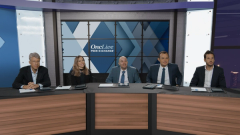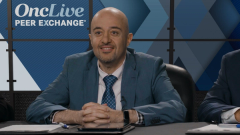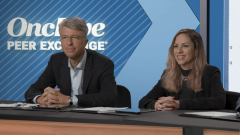
The Impact of p53 Mutations and 5q Deletions on Lower-Risk MDS Treatment Response
Dr Komrokji leads a discussion on emerging data on how p53 mutations and chromosome 5q deletions may affect prognosis, treatment response, and outcomes for patients with MDS.
Episodes in this series

Transcript:
Rami Komrokji, MD: The story of p53 mutations and del(5q) had been evolving because originally there was a ratio of papers saying that those patients, maybe 20% of the del(5q) will have p53 mutations, those have worse outcomes, they don’t respond to lenalidomide very well or for a shorter duration. I think there had been reports later on that basically said that a p53 mutation is not that bad in del(5q). I think to some point, most of what we see are really a monoallelic or not multihead p53 mutation at small clones. We looked in our database and the presence of those p53 mutations did not really impact the overall survival nor the response to lenalidomide and, surprisingly, in our database the SF3B1 mutation was associated with worse outcome in del(5q) and no response to lenalidomide.
But then I was looking into this also, there were some papers looking at when do you find those mutations or what happens to them, the clone during the course like if they were detectable at baseline vs detectable later on, which could be a fact of the technology that originally the threshold was missing less than 5%, but is the matter of the expansion of the clone. If those expand then it’s probably bad. I think the danger sometimes I see is we start adding more [and] we’re willing to transplant anybody who has p53 mutations immediately. And that’s not the case as you mentioned here. You always have to respect the p53 mutation in a way, but you don’t have to transplant everybody early on because this patient could have a 2- or 3-year response from this before progressing.
Uwe Platzbecker, MD: I would fully agree. I would just highlight a recent paper and blood by Benjamin L. Ebert, MD, PhD, a medical oncologist at the Dana-Farber Cancer Institute in Boston, Massachusetts and others where they looked at patients undergoing myeloma. Most of the cases were undergoing Revlimid long-term exposure and they showed that Revlimid may preselect for p53-mutated myeloid neoplasms. Although I think this cannot be completely transferred into the case here, but I just want to highlight there are also data available for del(5q) MDS [myelodysplastic syndrome] where Revlimid was given for very short times, 6 to 12 months then achieved a complete cytogenetic remission and then a drug holiday was followed. And I’m not suggesting that this is something that should be done with this patient, but I think it can be considered in patients with an excellent response where you basically treat beyond this response, and you may overtreat the patient and the TP53 clone may prevail or even increase over time. So, this is of course a very individual assessment here and may not be a reflection of the entire patient population, but I think we have to take also these p53 Revlimid non-MDS data seriously.
Rami Komrokji, MD: Absolutely. So, now the question as we see the central data coming out is, are you going to change your practice that you’ve treated del(5q)?
Guillermo Garcia-Manero, MD: I already did. That’s why I’m not 100% sold on it. I don’t see the damage or danger of starting a new assay and maybe this data with more follow up, but I find it very interesting. So, what Dr Komrokji is referring to is I think you said there was a European study where they had—and this addresses something that you just said that I think is quite important. So, they introduced the lenalidomide at a lower dose, 5 mg early in transfusion independent patients and they found 2 things. First, that they more than doubled the transfusion threshold life so it goes from like 2 point something years to like 6.3 years, which is really dramatic, really significant but I think there’s an update of this abstract attached with that over 80% cytogenetic response. And I’m wondering if these patients in time will go and have improved in survival. Now I believe the study has a crossover design so I don’t know if it will be powered to that, but I have the feeling that these patients will delay transmission responses, cytogenetic responses could do very well.
Dr Platzbecker said something that I think you’re right because I missed this. In this study for other reasons, they were not scientific, they were more I think economical, they only gave lenalidomide for 2 years and they stopped. So, many of these responses are long lasting without therapy. This is the only situation I know in MDS where you don’t need some type of chronic therapy, so I find this study really interesting. I think the responses are robust. I’ve done this now in 2 or 3 patients with nice responses.
I think we’re still learning. I think at the bottom what I learned from Sanam Loghavi, MD, is that I knew we will be monitoring cytogenetic evolution, we’ll be monitoring this molecular evolution. I will probably start a low dose a lenalidomide program more than an ESA based on that data, but I don’t see anything wrong with starting with an ESA switching to lenalidomide. I don’t think that would be a big deal either.
Transcript edited for clarity.








































